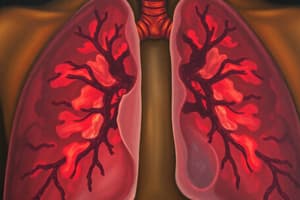Podcast
Questions and Answers
What is the most common treatment for carcinoid tumours?
What is the most common treatment for carcinoid tumours?
- Radiation therapy
- Immunotherapy
- Surgical excision (correct)
- Chemotherapy
What is the difference between typical and atypical carcinoid tumours?
What is the difference between typical and atypical carcinoid tumours?
- Typical carcinoid tumours have a higher mitotic rate
- Atypical carcinoid tumours have a very poor prognosis
- Typical carcinoid tumours can be associated with lymph node metastases
- Atypical carcinoid tumours have a higher mitotic rate (correct)
What immunostain is positive for adenocarcinomas?
What immunostain is positive for adenocarcinomas?
- AE1-3
- Cytokeratin 5/6
- TTF1 (correct)
- CD56
What is a possible positive immunostain for metastatic breast cancer?
What is a possible positive immunostain for metastatic breast cancer?
What is the most common subtype of primary epithelial malignancies?
What is the most common subtype of primary epithelial malignancies?
What is the most common benign lung tumour?
What is the most common benign lung tumour?
What are some non-metastatic systemic manifestations of lung cancer?
What are some non-metastatic systemic manifestations of lung cancer?
Which molecular alterations and driver mutations have been targeted in lung carcinomas?
Which molecular alterations and driver mutations have been targeted in lung carcinomas?
Which of the following is a risk factor for lung carcinoma?
Which of the following is a risk factor for lung carcinoma?
Which type of lung carcinoma is most likely to present with paraneoplastic syndromes?
Which type of lung carcinoma is most likely to present with paraneoplastic syndromes?
What is the primary aetiology of lung carcinoma?
What is the primary aetiology of lung carcinoma?
What are the diagnostic investigations for lung carcinoma?
What are the diagnostic investigations for lung carcinoma?
Flashcards are hidden until you start studying
Study Notes
Lung Tumours: Classification, Aetiology, Presentation, and Management
- Lung tumours can be classified as benign and malignant, with the majority being epithelial in origin.
- Hamartomas are the most common benign tumours and are usually incidental findings on chest X-rays.
- Malignant lung tumours are predominantly caused by cigarette smoking, and lung carcinoma causes more deaths per year than any other invasive carcinoma.
- Primary epithelial malignancies are classified into non-small cell carcinoma and neuroendocrine carcinoma, with adenocarcinoma being the most common subtype.
- Lung carcinoma has an incidence of approximately 2,750 cases per year in Ireland, with a rising incidence in females.
- The presentation of lung carcinoma depends on the site and stage, with local effects including cough, haemoptysis, and pleural/mediastinal involvement.
- Lung cancer can spread intrathoracically to hilar and mediastinal lymph nodes, causing superior mediastinal obstruction and Horner syndrome in apical lung tumours.
- Distant metastases can lead to non-metastatic systemic manifestations like cachexia, clubbing of fingers, and paraneoplastic syndromes.
- Investigations for lung cancer include radiology, blood tests, bronchoscopy, and tissue sampling.
- Molecular targeting therapies have been developed for specific molecular alterations and driver mutations in lung carcinomas, including EGFR, ALK, ROS-1, RET, and B-RAF.
- The management of non-small cell carcinoma involves surgery, chemotherapy, radiotherapy, molecular targeted therapies, and immune checkpoint inhibitors.
- Small cell carcinoma is extremely chemo-sensitive but has poor survival rates, with treatment involving chemotherapy and radiotherapy. Carcinoid tumours are neuroendocrine neoplasms that are usually treated by surgical excision.
Lung Tumours: Classification, Aetiology, Presentation, and Management
- Lung tumours can be classified as benign (hamartoma, papilloma, adenoma, chondroma, haemangioma) or malignant (primary epithelial, non-epithelial, or metastatic).
- Primary epithelial malignancies include non-small cell carcinoma (adenocarcinoma, squamous cell carcinoma, large cell carcinoma, NSCLC NOS) and neuroendocrine carcinoma (small cell carcinoma, large cell neuroendocrine carcinoma, carcinoid tumour).
- Lung carcinoma is the leading cause of cancer deaths globally, with approximately 2750 cases per year in Ireland and a rising incidence in females.
- Cigarette smoking is the primary aetiology of lung carcinoma, with 85% of cases occurring in smokers; other risk factors include city living, other types of smoking, industrial exposure, radon, other lung disease, and genetic factors.
- Presentation of lung carcinoma can vary depending on the site and stage, with local effects including cough, haemoptysis, pleural/mediastinal involvement, and recurrent pneumonia; distant metastases can also occur in the lymph nodes, bones, liver, and brain.
- Non-metastatic systemic manifestations of lung carcinoma can include cachexia, clubbing of fingers, and paraneoplastic syndromes, which can be mediated through various mechanisms and are mostly seen in small cell lung carcinoma but can also occur in squamous cell carcinoma and adenocarcinoma.
- Diagnostic investigations for lung carcinoma can include radiology (CXR, CT thorax, PET scan), blood tests (FBC, calcium, LFT, U&E), bronchoscopy (washings/lavage/biopsy, tissue sampling), and CT-guided biopsy.
- Molecular targeting therapies have been developed for specific molecular alterations and driver mutations in lung carcinomas, including EGFR, ALK, ROS-1, RET, and B-RAF.
- The management of non-small cell carcinoma can involve surgery, chemotherapy, radiotherapy, molecular targeted therapies, and immune checkpoint inhibitors.
- The Eastern Cooperative Oncology Group (ECOG) status, which evaluates comorbidities in addition to tumour stage, is important when assessing treatment options and prognosis.
- Small cell carcinoma is extremely chemo-sensitive but has poor survival rates; management can involve chemotherapy and radiotherapy.
- Carcinoid tumours, which are neuroendocrine neoplasms that usually arise in the central, large bronchi, can be classified as typical or atypical depending on the number of mitoses and percentage of cells in the cell cycle, and are generally treated by surgical excision.
Studying That Suits You
Use AI to generate personalized quizzes and flashcards to suit your learning preferences.




